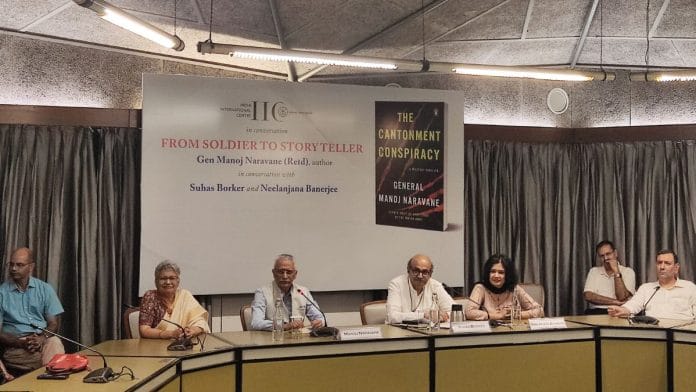New Delhi: General MM Naravane’s murder mystery Cantonment Conspiracy is set in the future, in March 2026. That’s when the first batch of women cadets from the NDA will graduate. The bold protagonist in the novel, Renuka Khatri, is from this batch.
The book follows two young officers, Lt. Rohit Verma and Lt. Renuka Khatri, who are posted at a sleepy garrison in Western UP. When a female officer is assaulted at a mess party, suspicion falls on Rohit—until Renuka uncovers darker secrets. As a key witness is murdered, the investigation spirals into a hunt for a hidden killer.
At the launch of the former Chief of Army Staff’s book, there were soft murmurs among the audience, people trying to explain General Naravane’s journey from “soldier to storyteller”.
“Why does it only have to be non-fiction and serious writing all the time? Why can’t it be something more light, and romantic?” he asked, inviting light chuckles from the audience, including his wife, Veena Naravane, who was sitting beside him.
“I think all of us have a story inside us,” said General Naravane. “The transition to becoming a storyteller was just an extension of all the good stories I’ve been telling throughout my life.” He was in conversation with Suhas Borker, broadcaster and trustee at IIC, and Neelanjana Banerjee, journalist with BharatShakti, at the India International Centre.
“All the experiences that I’ve had in some way or the other, do emerge in the pages of the book,” said General Naravane.
The story is incomplete without its woman protagonist and in real life, the General played a key role in bringing women into the NDA.
Naravane was quick to credit his then counterparts in the Air Force and Navy, RKS Bhadauria and Karambir Singh for the move.
“We had gone to the academy a number of times to see all the arrangements being made for the induction of the women cadets, which happened in July 2022, just after I retired,” he said.
Borker commented that the book reflects the ground reality. “There is some kind of mindset which is opposing women coming in, especially into a combat element,” he said. Naravane was quick to counter. “That’s the advantage of writing fiction. You can write whatever you want,” he said, “and with no accountability.” Laughter rang through the room.
When asked about the biggest challenge in writing the book, he said it was in adjusting the timelines to make it sound logical and in line with the service aspect, to ensure continuity in the rank a character is serving in after a certain period.
Besides that, it was picking the right names. “Finally, I did a mix and match. The commandant’s name in the book is Madan Verma. That is taken from Madan Das, who was my first CO and NM Verma, who was my second CO. Not pleasing or displeasing anyone,” he laughed.
Also read: This crime reporter turned his notes into a novel. ‘Exactly how a post-mortem is written’
The bigger picture
While General Naravane sells the book as just a military thriller, Borker pointed out that the book touches upon unemployment and simmering tensions in Bangladesh. During the discussion, the fictional commandant Madan Verma said that too much social inequality is bad for any country.
“Now that’s a critical comment. So I think this is saying more than just being a military thriller,” said Borker.
General Naravane elaborated, recalling his experience of serving in many insurgency-prone areas. He pointed out that in most cases of conflict, be it Manipur, Nagaland or Jammu and Kashmir, the underlying positive factor has been socioeconomic disparities and a perceived sense of deprivation. “If you actually study it in depth, at the bottom, one common factor which will be there throughout will be economics. That is something we have to look at, it’s the bigger picture for our country,” he said.
Banerjee complimented the General on the realism and vivid descriptions in the book, which were informed by his long years in the Army. She added that she would love to see the book turned into an OTT series. Borker agreed and said that Renuka could be a “serial detective”.
“It depends on the feedback I get. I am quite aware that the first book will probably sell more on my name rather than the story. Should I get good feedback from the storyline point of view, then definitely I would not be averse to writing more fiction. And again, not necessarily murder mystery, it could be humour,” Naravane said.
The values of duty and honour portrayed in the book best encapsulate his philosophy as a military leader, he told ThePrint. “In the name of honour, you should not sweep things under the carpet, or gloss over. You have to come clean,” he said.
The elephant in the room was again addressed when an audience member asked the General about his autobiography, Four Stars of Destiny, which has been under review by the Ministry of Defence for over a year. To which the General replied with his quick wit, “I think it is maturing, like aged wine. The longer it’s there, it becomes more and more vintage; of greater value.”
At the end of the question round, a young boy raised his hand and asked the General how to be an army officer. The general quipped that he should “have a lot of vegetables and play a lot of games outdoors, not only on the mobile.”
(Edited by Theres Sudeep)






